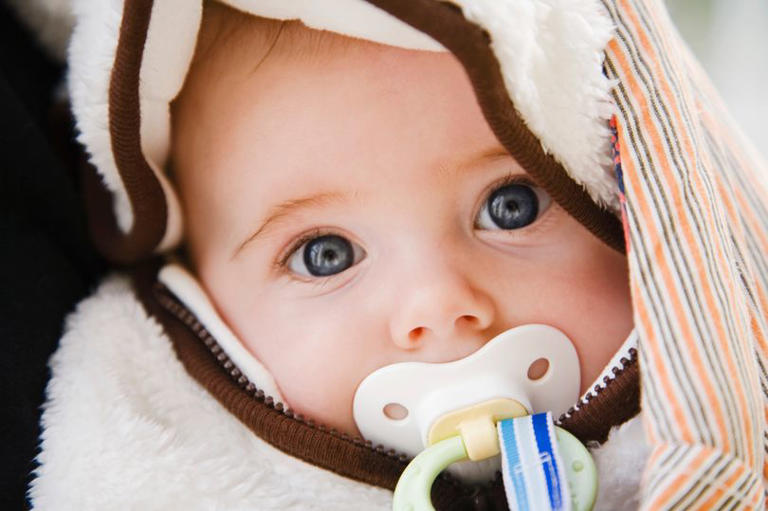![]()
![]()
![]()
![]()
![]()
![]()
![]()
![]()
![]()
Dentist shares when children should stop using dummies - or risk bite issues
Adentist has revealed when you should stop your child from using a dummy if you want to prevent problems with their teeth and bite.
Many babies and toddlers rely on a dummy for comfort and parents often find them a great help when trying to pacify an upset child or get them to sleep. But over reliance on them can have serious side effects that can affect their adult teeth and even their speech.
tudies have shown that prolonged use can result in bite problems such as excessive overjet, where the front teeth protrude outwards over the bottom teeth, or a narrow arch which can result in spacing issues with the teeth or an open bite, where there is a gap between the top and bottom sets of teeth.
Crucially, speech can also be affected as important development stages are reached while the dummy is being used.
A dentist has revealed that there are two key factors when it comes to using a pacifier in as safe a way as possible: "The effect of dummies on orthodontic issues hinges on two factors," paediatric dentistry expert Dr Sam Koh told Kidspot. "Frequency and duration."
He advises parents should limit dummy use during waking hours and should aim to stop using them entirely by the age of two or three years old. "It's a challenge, but reducing reliance on dummies can significantly mitigate potential dental concerns," said the award-winning cosmetic dentist.
Discouraging use beyond this age, he says, allows the jaws and mouth to settle before the permanent teeth come through. Weaning earlier than this age would be highly preferential, as would limiting use at bedtime, although this can be tricky for lots of families.
He suggests using a combination of strategies to wean such as limiting dummy use to particular times while you gradually phase it out. Positive reinforcement, introducing a comfort toy instead and reading a book could also help make it as stress free as possible.
Dr Koh warns parents to look out for signs of impacted teeth when relying on dummies. These can be changes in speech patterns, tongue thrusts or altered breathing. Regular dentist check-ups can identify any potential problems early.
If you are using a dummy, it's important to choose the right ones, which are flatter in shape. "Dummies with a symmetrical teat design support natural dental development, aligning teeth and jaws more closely," recommends Dr. Koh.
He also advises care instructions should be followed closely when it comes to keeping them hygienic, replacing them regularly and never storing them in the freezer. Children should also never share dummies, nor should they be dipped in food substances like sugar.
- Scientists have finally discovered the cause of morning sickness
- What young children need
- Breakthrough menopause drug that targets key symptom given approval for use in UK
- Keeping your children safe online: All you need to know
- Dear Exhausted and Burnt Out Parents, We’re Here to Help
- How to talk to your kids about death
- Use of menopausal hormone therapy beyond age 65 years and its effects on women's health outcomes by types, routes, and doses
- Scientists debunk myth that human brains are 'underdeveloped' at birth
- What are the health risks to children who vape?
- Changes to skin during menopause explained by experts, including dry skin and acne
- Acting Tips for Kids: How to Engage Your Child Through Theater
- How to nurture creativity in your kids
- Nine things you must consider before adopting a child
- An Overview of Psoriasis in Children
- DIY Fertility Tests Are On The Rise, But How Reliable Are They?
- Dentist shares when children should stop using dummies - or risk bite issues
- Top 10 benefits of breastfeeding
- Reye's syndrome: The illness that affects children
- Diphtheria symptoms: Everything you need to know after case confirmed at UK school
- Children with 'prominent' forehead may in fact be suffering from a dangerous illness
- Study assesses links between early negative life events, orbitofrontal cortical thickness and depression in young adults
- Placenta tumour: My miracle baby gave me cancer
- 7 things to look out for when it comes to vaginal health, according to gynaecologists
- What is the vaginal microbiome?
- What every woman should know about hormones, the pill and cancer
- Home
- Aches and Pains
- Children - Insomnia
- New Born Babies
- Babies From 2-12 months
- Spina Bifida
- Equipment Used
- Drug Abuse
- Other Ingredients
- The Handicapped Child
- Videos
- BALANITIS - Aromachildhood
- Worms
- Corona virus and pregnancy
- Contact Us
- Essential Oils for General Purposes
- The Methods - Aromatherapy - Children-2
- Hydrolats, Essential Oil Waters, and infused Oils
- Ringworm
- The Methods - Aromatherapy - Children- 3
- Basic Care Kit - Children - Essential Oils
- Web Links
- Acne
- Adolescent Acne
- The A - Z of Conditions
- Arthritis (juvenile Rheumatoid)
- Herbal Healing Infused Oils
- Things To Make For Your First Aid Cabinet
- The Cave Man Eating Plan
- The Basic Care Kit For Children
- Verrucas and Warts
- Caring Touch Massage
- The Methods - Aromatherapy - Children
- The Methods - Aromatherapy - Children - 4
- Athlete's Foot - 2
We have 48 guests and no members online







